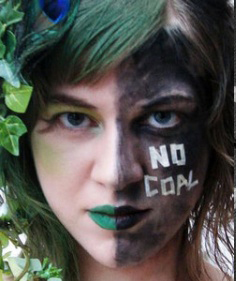Anti Coal Zombies 31 October 2011
Anti-Coal Zombie March, 10/31, 11:30am-5pm

- Date Monday October 31st, 2011
- Time 11:30am - 5pm
- Location Chapman Square @ SW Main/4th Downtown Portland
- Sponsor Rising Tide
- Purpose
The Anti-Coal Zombie March is organized by Rising Tide to highlight the banks that fund coal mining (Bank of America, Wells Fargo...) Rising Tide is an international, all-volunteer, grassroots network of groups and individuals who organize locally, promote community-based solutions to the climate crisis and take direct action to confront the root causes of climate change. Contact us at info@portlandrisingtide.org.
- Event Info
This is going to be an awesome event for anyone and everyone. Its a great chance to get your ZOMBIE on!! There will be face painters, tombstone making and lots of other great stuff going on. Bring a friend and have fun!
- Why we must defeat coal export
At this stage of climate chaos it is indefensible to invest any more money in nonrenewable fossil fuel infrastructure. Coal is the most carbon intensive fuel on the market and responsible for 80% of global warming emissions in the US.
Coal companies have destroyed the American landscape through dangerous mining practices and labor violations. In the one year since Big Coal brought export ideas to the Northwest, they have been caught lying on permit applications acting without permits at all.
Millennium unreported export plans for their Longview terminal by up to 75 million tones annually and Peabody illegally paved 9 acres of wetlands and trees to make way for their proposed 54 million ton facility. Before opening their doors, these companies have proven their toxicity to the communities they work in.
- Climate justice and coal export
Coal and other fossil fuel development is based on the practice and principle of externalizing costs, shoving them onto the general public and onto the natural world in the form of pollution, impacts to human health, and destruction of land and water resources. The coal exported through Northwest ports would be sourced from strip mines in the Powder River Basin of Montana and Wyoming and travel via open car rail through the Columbia River gorge.
Well water pollution is already an issue that forces many farmers in the Powder River Basin out of their rural lifestyles. An increase in demand for coal resulting from coal export terminals would further the environmental damage in the Powder River Basin where over 37,000 acres have already been strip-mined and abandoned by Big Coal.
Dozens of towns between the Powder River Basin and the coal export terminal are at risk of becoming “dirty coal train communities.” Each of the open air coal cars on the mile long trains proposed to transport coal to the export terminals releases 500 pounds of coal into the air, land and water during transit. Current export proposals would require up to 50 coal trains each day. Additionally, the small towns on the train routes are ill-equipped to deal with such high volume train traffic and have no contingency plans for the hospitals, schools and businesses that would be blocked by the heavy rail traffic.